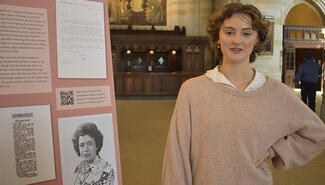Library joins academic partners in a two-year project to assess Yale’s “AI-readiness”
The growing, widespread use of ChatGPT and other forms of artificial intelligence (AI) to generate content is raising important issues, pro and con, throughout our culture—especially in institutions of higher learning.
In order to develop a proactive, coordinated response to the new technology, Yale University—represented by Yale Library, Yale’s Poorvu Center for Teaching and Learning, and Tsai Center for Innovative Thinking at Yale (Tsai CITY)—has partnered with 18 other academic institutions on a two-year-long project hosted by Ithaka S+R. As part of the nonprofit ITHAKA, Ithaka S+R helps academic and cultural communities “navigate economic, technological, and demographic change” to ensure best outcomes.
The Ithaka S+R project
Throughout the 2023–24 academic year, the 19 partners in the “Making AI Generative for Higher Education” project will work together, sharing information across units and institutions. Their goal is to develop strategies for maximizing the opportunities AI technologies offer and reducing their potential risks. Ithaka will support the group in developing “evidence-based, proactive, institution decision making about generative AI in teaching, learning, and research contexts.”
This fall and winter, project team members will be assessing their institutions’ “AI-readiness,” the ability to adopt and use AI—technically and organizationally—in a beneficial way.
Ithaka S+R will provide Yale’s teams with interview training in January 2024, and members will conduct interviews with students and faculty from March through May. Team member Lauren Di Monte, associate university librarian for research and learning, emphasized the value of having these one-on-one conversations with prospective users.
“The opportunity to learn directly from faculty and students about the problems and possibilities of AI will help us make sense of this dynamic space,” Di Monte said. “It will enable us to respond with programs, policies, and services that meet existing and emerging needs.”
Throughout the process of interviewing and assessing findings, Ithaka S+R will share existing data as a framework to guide the team. It will also provide other resources to assist the work, including a catalog of policies, best practices, and guidelines around generative AI and a tool to assess the AI products marketed to universities. “This project offers an opportunity to learn more about how faculty members’ changing research practices, in the era of AI, can inform their teaching practice,” said team member Alfred Guy, deputy director of the Poorvu Center.
“This research will also connect many other projects trying to understand the impact of AI on Yale—including surveys by the Yale College Committee on Majors, conversations with first-year students hosted by the Executive Committee, and a provost’s task force exploring the outer edge of AI capability and what it means for teaching and research over the next fifty years.”
After a series of design workshops, Yale’s team members will determine needed next steps and recommendations for the university. Ithaka S+R will compile and publish findings in October 2025.
The Yale team
In addition to Di Monte and Guy, the library’s project team includes Kassie Tuker, senior managing director, Tsai CITY, and these staff members from the Poorvu Center: Julie McGurk, director, teaching development initiatives, and Ryan Wepler, director of the graduate writing lab.
Barbara Rockenbach, the Stephen F. Gates ’68 University Librarian, and Jennifer Frederick, associate provost for academic initiatives and executive director of the Poorvu Center, will serve as project sponsors.
“AI is such a rapidly evolving topic,” Frederick said. “I’m excited about this project because it aligns with our campus-wide approach to addressing AI by engaging the community to identify opportunities and exchange ideas and lessons.”
AI tools are quickly becoming more readily available for everyone to use. In response, the Poorvu Center—in consultation with instructors and technology experts at Yale—has already provided guidelines for faculty about working with AI tools in the classroom.
—Deborah Cannarella



